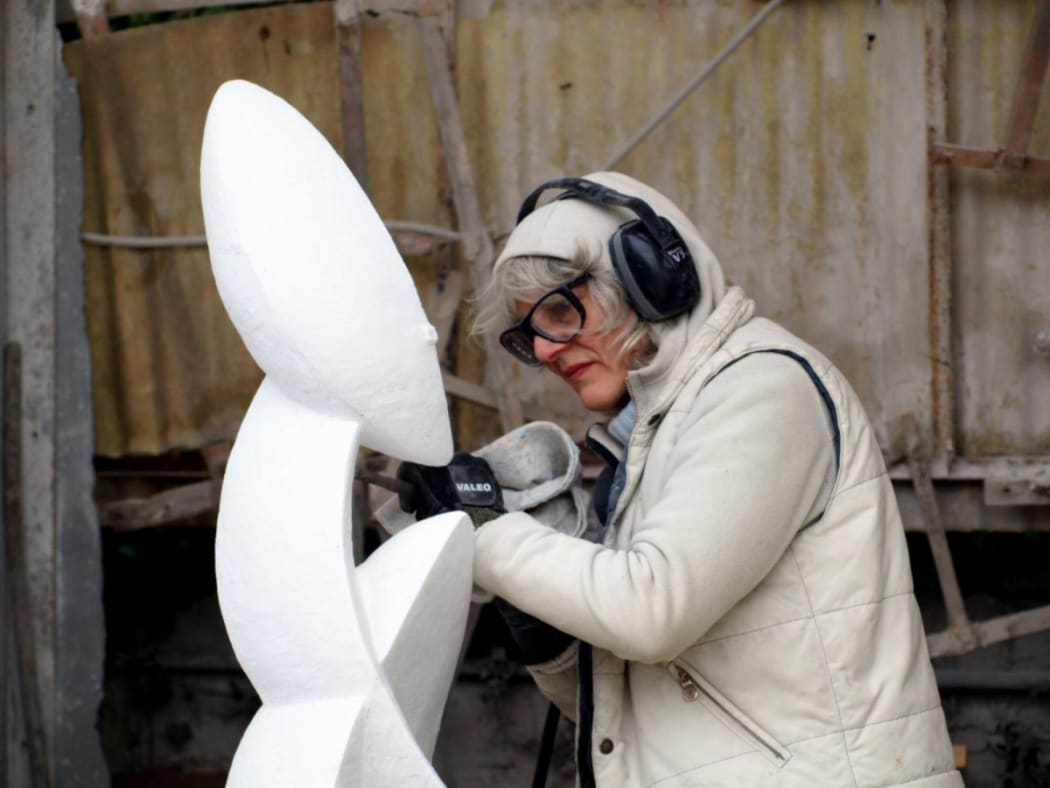
Following from our Steel Newsletter, and having brand new work on display at Kings Place including a striking welded steel wall sculpture, we would like to present Almuth Tebbenhoff in this month's Artist in Focus.
Almuth Tebbenhoff was born in 1949 in Fürstenau, in northwestern Germany. She moved to England at the age of 18, where she studied ceramics at the Sir John Cass School of Art (1972-75) and in 1977 she studied drawing at the Royal College of Art with Eduardo Paolozzi. A few years later she established her Southfields studio in a former church hall, where she still lives and works today. Having grown up with a father who owned a welder, it wasn't long before Tebbenhoff explored this path and in 1986 she started a two-year course in metal fabrication at South Thames College, London.
"Sculpture is my language. First I worked with clay for over ten years, then I started using steel, a material that my father had used for his functional, agricultural inventions. Steel became my main material for the next 20 years and I invented my own particular technique using steel angle section. I wanted to achieve undulating lines without bending the steel - that felt too messy, so I made ‘pixillated’ curves by cutting randomly angled pieces and welding them together. I developed large open-sided containers from lines that moved and danced and to me looked humanised rather than industrial. These containers without walls made from steel angle section are very close to my heart. It’s the emptiness within them that has become such an important part of my life through silent meditation, which I have been practicing since 1983."
In the early 1990s, Tebbenhoff was invited by the Jodrell Bank Science Centre in Cheshire to mount a site-inspired installation. She showed a range of wall-mounted pieces, 'Petrified' in grey painted steel alongside their related, half-burnt welding templates. With their sharp geometries and fractal forms, they reveal Tebbenhoff’s pre-occupation at that time with illusory spatial planes and suggestions of other realms beyond the here and now.
Tebbenhoff's early steel pieces were mainly monochrome (referencing the sombre grey mood of a post-war Germany in the 1950s) abstract explorations of space and volume through geometric devices. From the early nineties, Almuth started moving towards a freer mode of expression, creating explosive forms in bright colours such as the striking work below, which is part of her Steel Garden series.
In 2006, while on a residency in Pietrasanta, Italy, Tebbenhoff began to work with marble, and since then her practice has spanned a variety of materials.
"Steel had given me angular skeletal structures and the engineering side of my brain loved to solve geometric puzzles. The missing bit had been volume, which I got from marble. I now bounce between these two main materials, still making sculptures about light entering into a space/material and revealing nothing that you could put your finger on."
Almuth Tebbenhoff now works mainly with steel, stone, bronze and clay aside from her drawings. Whether working on a miniature piece or on a monumental scale, Tebbenhoff always comes back to the same central themes of the universe and its vastness, eternity and the meaning of life.
“The infinity of cosmic space reduces us to mere atoms. (...) I mean my sculptures to be emblematic of a world built on foundations of love and compassion.”
RECENT WORK
Almuth Tebbenhoff's most recent work meditates on notions of the self in relation to the world around us, and returns to organic colour and form. On display in the Ceramic Windows at Kings Place, ‘Who Will Buy my Dark Dark World’ consists of a group of sculptures that she started making during the autumn of 2019, as the world was heading towards the pandemic. Tebbenhoff's sculptures have the capacity to explore the most humble of subjects and familiar of forms while also communicating much grander concerns with creation, humanity and our relationship with nature.
READ an interview with the artist during lockdown.
BROWSE through a price list of Almuth's work.
WATCH a short film about Almuth's ceramic installation.
WHERE CAN YOU SEE ALMUTH'S WORK?
Pangolin London
New Work, 2020
Click here for a list of works.
St George's Hospital, London
Soft Pillar, 2004
David Wilson Library at Leicester University
Flying Colours, 2008
“I wanted to catch the moment of pure frustration when the mind is locked in a dead end and then to set it free by an act of bravery – by throwing away what has been done to make way for fresh thoughts, for a new beginning. So there they are now floating freely through the foyer.”
ALMUTH TEBBENHOFF WORKs AVAILABLE
